IN THIS SECTION
The Bycatch Mitigation Initiative has three key components: a Standing Working Group to oversee the Initiative, a co-ordinator with the technical knowledge to lead the programme, and an Expert Panel to provide advice.
The Expert Panel is a 25-strong, multi-disciplinary group. It incorporates a wide range of global leaders in bycatch and related fields, including biology, ecology and zoology, fisheries - industrial to artisanal scale, economics, social science, law and policy development; regulation and compliance. The Panel works with the Scientific Committee of the IWC as well as with other international, regional and specialist organisations.
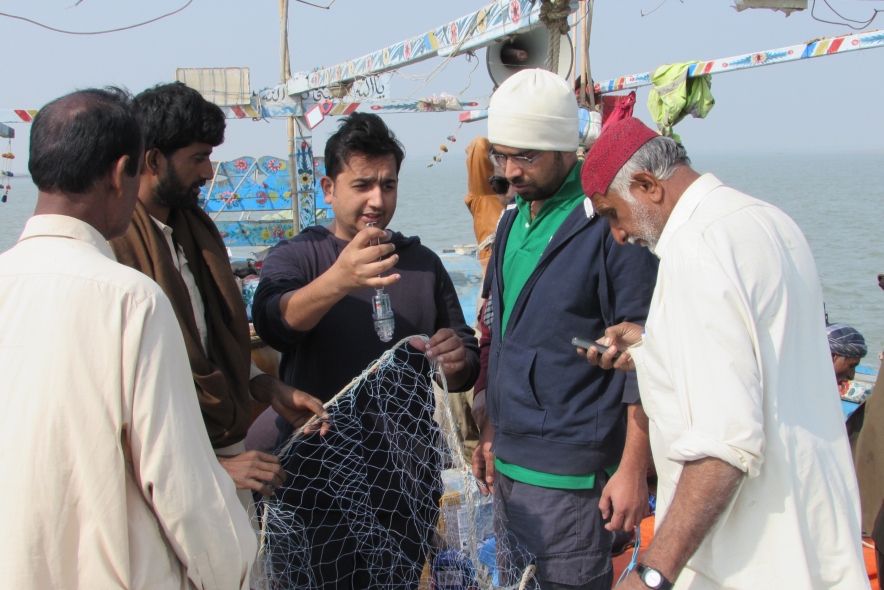
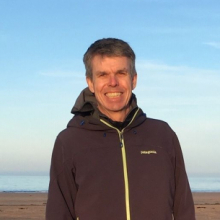
Per Berggren
Dr Per Berggren is a Senior Lecturer in the School of Natural and Environmental Science, Newcastle University, UK.
Read more
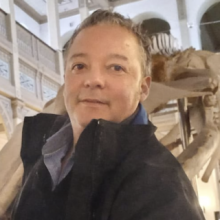
Luis Cocas
Luis Cocas is a Marine Biologist from the University of Valparaíso (Chile), with over 23 years of experience in fisheries sciences and management...
Read more
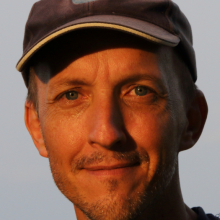
Tim Collins
Tim Collins works for the Wildlife Conservation Society. He is the Africa Co-ordinator of the IUCN Cetacean Specialist Group...
Read more
Dr Berggren has been engaged in research related to assessment and mitigation of cetacean bycatch since the early 1990s. He has attended IWC Scientific Committee (SC) meetings since 1990. Dr Berggren has contributed to a large number of publications that have addressed assessment and mitigation of cetacean bycatch, including IWC publications, and SC meeting documents and working papers. Dr Berggren gave presentations and organized workshops on innovative, low-cost methods to reduce marine mammal bycatch in global, artisanal gillnet fisheries at the 2015 and 2017 Society for Marine Mammalogy Biennial Conferences. These methods include the use of glass-bottle alarms, plastic-bottle acoustic reflectors, and mass-producible solar charged fluorescent lights. Each solution represents a different strategy (sound, echolocation efficiency, light) to alert cetaceans to the presence of nets with potential for combined or separate application depending on local and environmental conditions. Dr Berggren has conducted several trials of acoustic alarms in Swedish and East African gillnet fisheries to test their efficacy at reducing harbour porpoise and dolphin bycatch in bottom-set and drift-gillnet fisheries. He is one of the lead scientists in a western Indian Ocean project that is conducting a comprehensive assessment of megafauna catch and bycatch in small scale gillnet and longline fisheries. In addition, he is developing and testing low-cost bycatch mitigation methods for these fisheries in Madagascar and Zanzibar, and prawn trawl fisheries in Kenya.
Luis Cocas is a Marine Biologist from the University of Valparaíso (Chile), with over 23 years of experience in fisheries sciences and management, acquired through his work with local and foreign universities and governmental agencies. Within his experience, highlights include his former work as a fisheries observer for NOAA's North Pacific Groundfish Observer Program in the Bering Sea and Gulf of Alaska, between 2003 and 2011. Luis has also been member of the International Fisheries Observer and Monitoring Conference’s Steering Committee for the last 5 versions. Since 2013 Luis has coordinated both the Observer and Bycatch Programs at the Undersecretariat for Fisheries in Chile where, along with a team of colleagues, he led the implementation of an extensive process of diagnosis, reduction, and control of discards and incidental bycatch in Chilean fisheries, including the incorporation of new technologies to monitor fisheries (EMS). This process has involved the joint efforts of the management agencies along with a collaborative work with the fishing users, leading the country to the gradual solution of the problem. Regarding marine mammal bycatch, measures have recently been enacted for purse seine, traps, trawling, and gillnets, establishing the use of devices, application of manoeuvers to release specimens, handling protocols, and codes of good practices, among others. Mr. Cocas is willing to contribute with his knowledge and to collaborate with the expert panel in bycatch related fields to support cetaceans’ conservation.
He is the Africa Co-ordinator of the IUCN Cetacean Specialist Group and the Scientific Co-ordinator of the Arabian Sea Whale Network. He has worked with cetaceans, including strandings and bycatches, in various countries ranging from Oman and the United Arab Emirates, to Angola, Madagascar and Gabon. Most recently Tim has worked to identify and mitigate gillnet bycatches of Critically Endangered Atlantic humpback dolphins in Congo. This has included helping to implement a participatory programme to quantify and map artisanal fishing behaviour across most of the Congolese coast. The work yielded high resolution data for relatively low cost, and fills a frequently cited gap for the management of small fisheries. Tim currently lives in Kenya but continues efforts to further the work of various projects in Oman and Central and East Africa.
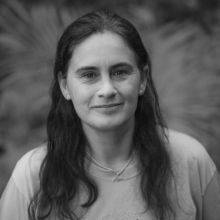
Marta Jussara Cremer
She has been a professor at the University of the Region of Joinville, in southern Brazil, since 2000, coordinating the Laboratory of Ecology and Conservation of Marine and Coastal Tetrapods.
Read more
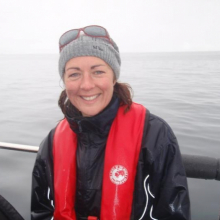
Sarah Dolman
Sarah Dolman works for Environmental Investigation Agency (EIA) and co-ordinates EIAs global bycatch programme....
Read more

Camila Domit
Camila Domit has extensive experience in marine megafauna ecology and has been part of various projects and initiatives to support conservation.
Read more
She is interested in studies related to population ecology, distribution, bioacoustics, movements and behavior, as well as impact assessment, planning and environmental management. She participates in the Brazilian stranding network, developing studies related to mortality, health condition, fishing interaction and biological parameters of several species of tetrapods. Since 1994 she has been involved in research activities related to the incidental capture of small cetaceans in southern Brazil, and coordinates a long-term project with Franciscana dolphins, which includes also activities related to environmental education and scientific communication, with a strong focus on incidental capture assessment. In 2023, her team started the first project in Brazil with the use of pingers in gillnets, focused on artisanal fishing, integrating different stakeholders. She is a member of the Franciscana Action Plan Advisory Group, in Brazil, and member of the Brazilian Commission in the IWC Scientific Committee.
Sarah has focused on cetacean conservation and welfare issues for 30 years. She is currently working to prevent cetacean bycatch by focusing on implementation of existing laws in Europe and the US, and focusing on critically endangered species, including efforts to prevent vaquita bycatch in Mexico, and in West Africa, as chair of the Bycatch Working Group of the Consortium for the Conservation of the Atlantic Humpback Dolphin (CCAHD). She has been involved in field efforts such as whale entanglement reduction in Scottish creel fisheries, as well as the development of new cetacean bycatch legislation in Europe. Sarah has an MRes in fisheries science and has authored book chapters, publications and policy briefings on preventing cetacean bycatch.
For the past 20 years, she has been working along the Brazilian coast, assessing multiple impacts caused by both fisheries interactions and coastal development, mainly focusing on dolphins, sea turtles, seabirds, and sharks. She integrates interdisciplinary methods and participatory approaches, encompassing monitoring and ecological assessment of biodiversity; local community engagement in sustainable resource management; outreach, science communication, and local governance, raising awareness of marine conservation and the significance of effective conservation strategies. Camila and her scientific team are evaluating bycatch and mortality rates of small cetaceans along the south and southeastern Brazil, assessing their health condition and exposure to cumulative threats, besides promoting better practices to reduce the effects of impacts and to achieve successful bycatch mitigation initiatives, focusing on small-scale fisheries and on integrating of socioeconomic and ecosystem needs. She has attended the scientific committee of IWC since 2018. Her commitment extends to actively participating in panel discussions, sharing knowledge and experiences, and supporting practical solutions to reduce the impacts of fishing on marine mammals.
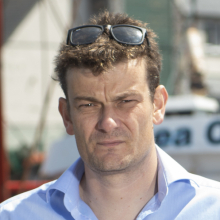
Rob Enever
Dr. Enever has a Ph.D in bycatch mitigation and extensive, first-hand experience of working with the fishing industry.
Read more
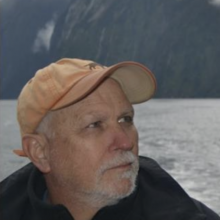
Dennis Heinemann
Dr. Dennis Heinemann is Senior Advisor for Fisheries & Ecosystems with the U.S. Marine Mammal Commission.
Read more
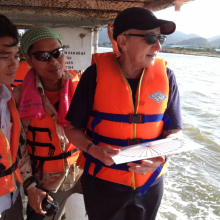
Ellen Hines
Dr. Ellen Hines, the Associate Director of the Estuary & Ocean Science Center, is a Professor in Geography at San Francisco State University.
Read more
He has spent a decade on vessels around the world, and more recently informed EU policy on discards in marine fisheries through the UK Government’s Research and Development agenda. He spent 7 years working for a UK Statutory Nature Conservation Body where he was responsible for ensuring the objectivity, quality and transparency of the marine evidence used for designating, and subsequently managing, Marine Protected Areas. Dr Enever currently works as Head of Science and Uptake for Fishtek Marine, a UK-based company that designs and manufactures technologies to prevent the bycatch of marine species. Fishtek Marine’s in-house team of multi-award-winning engineers works to a difficult set of criteria; products must deliver the conservation gains they are designed for, but must also be practical, durable, low cost, and have no impact on either target catch or fishing operation.
Prior to joining the Commission in 2011, he was a senior scientist with Ocean Conservancy, where he focused on fisheries, marine protected areas and climate change. For much of the 1990s, Dr. Heinemann was a senior research scientist in the Division of Marine Research of Australia’s Commonwealth Science and Industry Research Organization, where he worked on interactions between longline fisheries and seabirds, marine reserve design and performance, and human impacts on nearshore marine ecosystems. Over his career, Dennis has worked with marine birds, fish and mammals, and his research experience includes community dynamics, oil spill impacts, population dynamics, fisheries bycatch, fish stock-assessment modeling, fisheries management and policy, and marine protected area policy and design. He holds master’s degrees in avian ecology and applied statistics, and a Ph.D. in marine ecology.
Her research addresses population and community ecology of threatened and endangered species incorporating local conservation efforts and regional scale coastal and marine management science. Her emphasis is on the evolution of consistent standards of field methods and monitoring techniques, and the creation of educational materials to be applied to community-based conservation planning. Dr. Hines also has extensive (since 1990) experience in GIS and remote sensing for marine and coastal spatial planning. She is committed to collaborating internationally with in-country scientists to solve conservation problems threatening marine mammals. Dr. Hines has conducted marine mammal research in Thailand, Vietnam, Cambodia, Malaysia, Myanmar, Japan, Belize, Peru, Chile, Oman, Canada, and the U.S. since 1997. Internationally, Dr. Hines is an ASEAN research Fulbright Fellow. She has served on the CMS Scientific Council’s Aquatic Mammals Working Group since 2013, and as an invited expert to the Sirenian Specialist Group of the IUCN SSC since 2005. She is a member of the IUCN Marine Mammal Protected Area Task Force and the IUCN World Commission on Protected Areas. In 2013, she co-led the Third Southeast Asian Marine Mammal Symposium in Malaysia, and led the publication of a report on this workshop published by the UNEP/CMS Secretariat. Dr. Hines has been a member of the Society for Marine Mammalogy since 1994, and is currently a member of the Ethics Committee (since 2016). In California, Dr. Hines works closely with the NOAA National Marine Sanctuaries and local scientists around San Francisco Bay to model habitat use and human threats to marine mammals and seabirds. She is a research advisor on the Greater Farallones National Marine Sanctuary Advisory Council. With her students, she works to create risk assessments for anthropogenic threats such as shipping collisions, marine megafaunal bycatch and the effects of sea level rise on pinnipeds, sea otters, and birds in coastal estuaries. In 2017, Dr. Hines co-created the Bycatch Risk Assessment (ByRA) toolkit with funding from NOAA’s Office of International Affairs and the Monterey Aquarium Seafood Watch. The ByRA toolkit is a spatially and temporally explicit tool for the assessment of marine megafaunal bycatch risk for fisheries management (especially under the U.S. MMPA restrictions) and conservation planning. With local scientists, she has conducted bycatch risk assessments in Thailand, Malaysia, Vietnam, Indonesia, Sri Lanka, India, Oman, and Peru. She is currently co-leading a Lenfest Oceans project with Chilean fisheries agencies and scientists to use the ByRA toolkit for marine mammal bycatch analysis in 19 fisheries along the coast of Chile. Dr. Hines has led ByRA training workshops in Thailand, Malaysia, Vietnam, the Philippines, Colombia, Peru, Chile, and India.
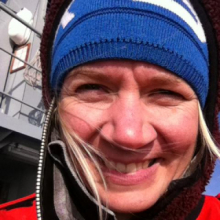
Lotte Kindt-Larsen
Researcher at the National Institute of Aquatic Resources, Technical University of Denmark, Dr. Kindt-Larsen studies the interactions between fisheries and protected...
Read more
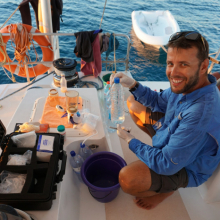
Jeremy Kiszka
Dr. Jeremy Kiszka is an Associate Professor at Florida International University in Miami.
Read more
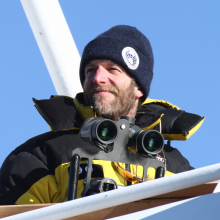
Russell Leaper
Russell has been involved in discussions of the IWC Scientific Committee since 1996, acted as rapporteur for the...
Read more
Endangered and threatened species. Her work focuses on bycatch monitoring by use of video and sensor systems, bycatch risk predictions, bycatch reduction tools such as acoustic deterrent devices and development of fishing gears to avoid depredation or to protect endangered and threatened species. She participates in national and international discussions with authorities on management options, best practices and protection of marine mammals, and collaborates with fishers for gear development, management options, fishing practices and implementation of CCTV on-board fishing vessels. Furthermore she is the Danish delegate at ICES council working groups for Bycatch of Protected Species (WGBYC) and Fishing Technology and Fish Behaviour (WGFTB), and a member of the Expert Committee on Fishing Technologies (ECOFT) advising the Mexican government on gear technology for protecting the vaquita.
Dr. Kiszka is a marine ecologist and conservation biologist with a strong interest in bycatch assessment and mitigation, particularly in Indian Ocean tuna fisheries and in small-scale fisheries around the globe. Over the last 20 years, he has developed multiple projects on assessing and mitigating marine mammal bycatch. He is also a member of the IUCN Cetacean Specialist Group and a member of the Red List Authority.
Russell has been involved in discussions of the IWC Scientific Committee since 1996, acted as rapporteur for the Committee’s Bycatch/Human Induced Mortality working group 2001-2011 and then as convenor since 2012. This has given him a good knowledge of the discussions within the Scientific Committee related to bycatch over the last 20 years. He was joint coordinator for the ASCOBANS Conservation Plan for Harbour Porpoise in the North Sea (which was primarily concerned with bycatch) from 2010-2011 and subsequently chaired the ASCOBANS bycatch working group until 2014. He has authored numerous publications, and presented more than 50 papers at international scientific conferences related to cetaceans. He has worked as a bycatch observer on gillnet fishing vessels (Tregenza et al. 1997a,b) and has also worked on estimation of bycatch rates (Moore and Leaper, 2011). More recent research has included analysis of humpback whale entanglements off Scotland (Ryan et al., 2016) and a review of methods used to reduce risks of cetacean bycatch and entanglement (Leaper and Calderan, 2017).
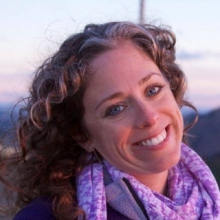
Kristy Long
Kristy Long leads the U.S. national marine mammal bycatch reduction program for NOAA's National Marine Fisheries Service.
Read more
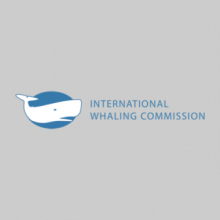
Cara Masere
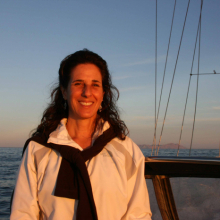
Sarah Mesnick
Sarah Mesnick leads communication and external affairs for the Southwest Fisheries Science Center (SWFSC) NOAA Fisheries...
Read more
Kristy has worked for more than 20 years on all aspects of bycatch reduction, from identifying and quantifying bycatch to developing, implementing, and monitoring the effectiveness of mitigation measures primarily focused on North Atlantic right whales, humpback whales, false killer whales, pilot whales, harbor porpoise, and bottlenose dolphins as well as sea turtles. She also leads NOAA's efforts to develop guidelines for safely deterring marine mammals from damaging fishing gear, catch, and private property.
Is an ecologist in the SWFSC’s Marine Mammal and Turtle Division and is adjunct professor and a co-founder of the Center for Marine Biodiversity and Conservation at Scripps Institution of Oceanography, University of California San Diego. Her research focuses on the behavioural ecology of marine vertebrates. The main goal of these studies is to provide a behavioural framework within which to investigate population identity, population trends and fishery interactions in cetaceans. Sarah has worked in the Gulf of California since 1986 and been involved in vaquita conservation for much of this time. Currently, her work is focused on using market-based incentives to eliminate vaquita bycatch in gillnet fisheries, which is driving the species to extinction and causing social unrest and economic hardship in the region. She works strategically with government agencies, NGOs and academia to build support for bottom-up, incentive based approaches that complement top-down, command and control measures to eliminate illegal fishing while supporting local communities. Other work includes investigating opportunities for economically viable, alternative livelihoods to wild-capture fisheries, including aquaculture, sportfishing and green energy.
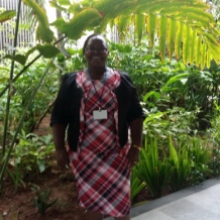
Elizabeth Mueni
Elizabeth is Deputy Director of fisheries, working for the Kenya Fisheries Service, State Department for Blue Economy and Fisheries.
Read more
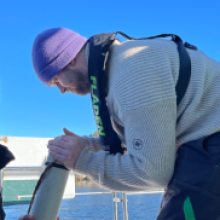
André Moan
André is a quantitative marine biologist and researcher at the Institute of Marine Research in Norway.
Read more
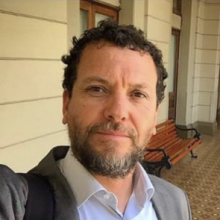
Jorge Guerra Münchmeyer
Biologist, Master of Science in Ecology, with academic experience in the ecology of marine invertebrates and in the public sector in the administration and management of benthic fishing resources.
Read more
She has experience working with fisheries management for 20+ years. She holds an MSc degree in Environmental Science - Planning and Management. She is currently a PhD student in fisheries management at the University of Eldoret, Kenya. She has been responsible for environment and conservation of fisheries resources and related ecosystems. She coordinates the development and implementation of fishery-specific management plans and also gives guidance on areas that need regulations for fishing gears and species. Elizabeth has also been involved in managing fisheries interactions with endangered species, especially sea turtles and marine mammals, with major focus on trawl and gillnet fisheries. She works closely with research institutions and conservation agencies.
He holds a PhD in marine mammal bycatch quantification and mitigation. He has extensive experience working with the fishing industry, especially on testing acoustic deterrents and other bycatch reduction measures. He has expert knowledge of several aspects of fisheries management, bycatch issues, enforcement and compliance. André is a Norwegian delegate to several ICES and NAMMCO working groups dealing with marine mammals and interactions with fisheries. André is interested in bycatch monitoring methods, and in particular CCTV remote monitoring on fishing vessels, mapping bycatch risk, and statistical modeling in data poor studies.
He currently works in the Biodiversity and Ecosystem Management Unit, of the Fisheries Administration Division, Undersecretariat of Fisheries and Aquaculture, of the Ministry of Economy, Development and Tourism of Chile. In this institution of the State of Chile, he is in charge of the management and conservation of marine mammals and the application of the ecosystem approach in fishing regulations, particularly in the reduction of bycatch.
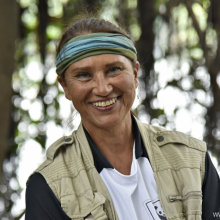
Miriam Marmontel
Miriam Marmontel is a Brazilian oceanographer by background, with PhD in wildlife conservation.
Read more
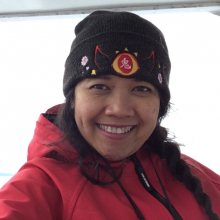
Dr Putu Liza Mustika
Dr Putu Liza Mustika ("Icha") was one of the first Indonesian nationals to focus her research on human impacts on cetacean ecology.
Read more
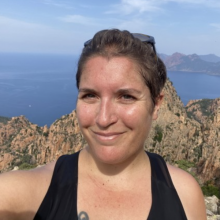
Hélène Peltier
Through her researcher position in la Rochelle University (France), most of her research is focused on the estimation of small cetacean bycatch in fishing gears, as well as identifying involved fisheries...
Read more
She has been working with the Mamirauá Institute in Tefé, western Brazilian Amazon, for the past 30 years, where she leads a research group conducting ecological and demographic studies on the five genera of Amazonian aquatic mammal species. Miriam is a member of the National Action Plan on Amazonian Aquatic Mammals, and the National and Northern networks on strandings and conservation of aquatic mammals. Her group gathers reports, collects carcasses, and performs necropsies of aquatic mammals to understand mortality causes, including climate-related. Since 2022 the group has been testing the use of pingers to reduce bycatch of Amazonian river dolphins. In 2021-2022 they conducted a Brazilian Amazon-wide survey with fishermen, as part of a regional effort to understand and mitigate the bycatch problem.
Icha has assessed the sustainability of dolphin watching tourism, developed an Indonesian-wide whale stranding reporting database and investigated the incidence of bycatch in various types of local fishing gear as well as documenting the use of this bycatch as wildmeat, with support from the IWC Small Cetacean Research Fund. Icha pro-actively works with the Indonesian government to better manage marine mammals and, through her NGO ‘CETASI’ (Cetacean Sirenian Indonesia), conducts primary research and education outreach programmes.
Through her researcher position in la Rochelle University (France), most of her research is focused on the estimation of small cetacean bycatch in fishing gears, as well as identifying involved fisheries, the comprehension of bycatch process and its mitigation in French and European waters. She developed the "reverse drift modelling method", in order to infer small cetacean bycatch from stranded animals. She participates in national working groups on bycatch with national and local authorities, managers, scientists, fishermen and NGOs. She also takes part to many research projects on bycatch estimation and mitigation, at national and European scales. She joined the ICES Working Group on BYCatch of protected species (WGBYC), as the delegate for France, and has been involved in different ICES workshops and working groups on small cetacean bycatch. She is also a member of the ASCOBANS-ACCOBAMS joint group on bycatch, and joined French IWC delegation in 2023.
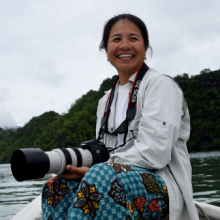
Louisa Ponnampalam
Louisa is from Malaysia, and is the Executive Director and Co-Founder of The MareCet Research Organization, a grassroots organisation focused on the research and conservation of marine mammals in the country...
Read more
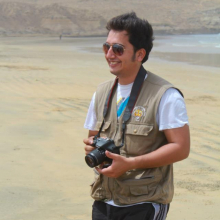
Umair Shahid
Umair Shahid, a seasoned development professional, boasts expertise in sustainability, fisheries, climate change adaptation, ocean governance, environmental education, resource mobilization, and extensive research.
Read more

Zak Smith
Mr. Smith is a Senior Attorney and Director of the Wildlife Trade Initiative for the Natural Resources Defense Council (NRDC).
Read more
At present, MareCet's research is focused on Indo-Pacific finless porpoises, Irrawaddy dolphins, Indo-Pacific humpback dolphins, dugongs and Bryde's whales. Together with her team at MareCet, her scientific research includes the study of cetacean and dugong distributions, movement patterns, bioacoustics, interactions with human activities and assessment of bycatch risks within Malaysia. The science is then applied to policy advocacy work, and marine education and outreach initiatives. One of MareCet's newest programmes of work is on bycatch mitigation trials for coastal cetaceans in artisanal gillnet and commercial trawl fisheries in Peninsular Malaysia. Louisa presently serves as Regional Coordinator for Asia and Afro-Asia on the IUCN Cetacean and Sirenia Specialist Groups respectively. She also provides mentorship and capacity training for research and conservation approaches to young and up-and-coming colleagues in Myanmar, Vietnam and Thailand. Louisa is a Pew Marine Fellow.
For 16 years, he has been a driving force at the World Wildlife Fund (WWF), where his dedication to conservation and sustainable management has thrived. Currently, Umair serves as WWF's Senior Indian Ocean Tuna Manager, working closely with the Indian Ocean Tuna Commission and member states. His efforts are instrumental in championing ambitious conservation measures for tuna, vital target species, and non-target species. Umair has excelled in the challenging realm of bycatch management along Pakistan's coast for several years. His influence extends regionally, supporting management initiatives in the South West Indian Ocean and broadly in the Indian Ocean. Presently, Umair focuses on crafting mitigation strategies for tuna directed gillnet and driftnet fisheries and is working towards having multi-species, multi-taxa mitigation and management approaches adopted in the Indian Ocean Tuna Commission. He collaborates closely with fishermen, skippers, and boat owners, fostering partnerships for critical bycatch research within Pakistan's tuna fleet. In 2023, Umair Shahid assumed the role of International Board Member for the Fisheries Transparency Initiative (FiTI). Here, he guides the organization in enhancing transparency and participation for global sustainable marine fisheries management. Moreover, Umair Shahid holds the esteemed title of Ocean Leader Fellow at the University of Edinburgh, solidifying his status as an authority in marine conservation and governance. His multifaceted career continues to shape sustainability and marine resource management worldwide.
He has undertaken extensive reviews of US laws, including the Marine Mammal Protection Act, as well as state legislation, analyzing how these regulations impact bycatch of marine mammals. In addition, he brings an in-depth knowledge of international treaty law related to the marine environment. Mr. Smith is co-author of the report “Net Loss: The Killing of Marine Mammals in Foreign Fisheries” which identified species at risk of extinction resulting from global commercial fishing operations. He has worked extensively on issues related to the critically endangered vaquita, and currently serves as a member of the Vaquita Regulatory/Legal Task Force established under the Memorandum of Understanding (MOU) between the Government of Mexico and various private foundations looking to address the use of gillnets in the Upper Gulf of California. Mr. Smith has also worked with legislators and the seafood industry in California regarding the development of market-based initiatives, both voluntary and regulatory, that promote the use of vaquita-safe fishing gear.
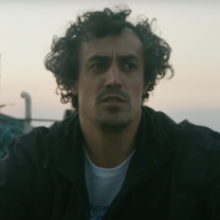
Federico Sucunza
Federico is an Associate Researcher at Grupo de Estudos de Mamíferos Aquáticos do Rio Grande do Sul and Instituto Aqualie, Brazil.
Read more
He has become an expert in various research techniques, and his research is contributing to the improvement of the conservation of several species. He is currently the coordinator of a fishery monitoring program to assess bycatch rates of threatened species, including the franciscana (Pontoporia blainvillei), in southern Brazil. This has included working with fishers to implement cost-effective bycatch mitigation methods and remote electronic monitoring in small-scale fisheries. He is a member of the Franciscana Action Plan Advisory Group and the IUCN Marine Mammal Areas Task Force, acting as Coordinator of the SWATLO IMMAs Brazil Regional Group.
Bycatch correspondence group: Arne Bjorge, Andy Read, Eduardo Secchi, Ingrid Maria Furlan Öberg, Larissa Dalpaz.
Latest Tweets

International Whaling Commission
Suite 2, First Floor, Victory House, Vision Park, Histon, Cambridge, CB24 9ZR
+44 (0) 1223 233 971
secretariat@iwc.int
Subscribe to the IWC Mailing List